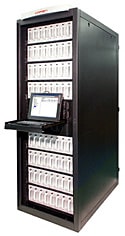Believing that enterprises are willing to eschew tape storage for disk-based systems, storage start-up Copan Systems has unveiled a disk library it believes will revolutionize the market for backing up seldom-used files.
The Longmont, Colo.-based company is positioning the Revolution 200T as the first and only storage machine to deliver a disk-based data repository with the performance, availability, and protection of disk and the price and scalability of tape.

Copan Revolution 200T
Copan President and CEO Dave Davenport Davenport told internetnews.com the Revolution 200T is geared for backing up and restoring hefty programs such as scientific research applications in Fortune 1000 companies for long periods of time. The product scales from 56 terabytes to 224TB in a single cabinet that houses up to 896 Serial ATA
“Think of it as a refrigerator or a closet where you put 1,000 disk drives in it,” Davenport says. “This is for data that is for backup/recovery or compliance data that is accessed sequentially, or write once, read rarely or occasionally. But we can move up to 2.4 terabytes of data per hour in and out of our system, which is faster than tape.”
Davenport reports that due to pressures in the market for faster backups and better recoveries, as well as legal compliance and a general trend toward bringing more data online, there is an increased focus on the marketplace for the disk library because of an increase in reference or secondary storage data.
Copan, which emerged from stealth mode in January, hopes to be at the forefront of that disk evolution.
After all, enterprises spent $1.7 billion on disk-based storage in 2003, according to Michael Peterson at Strategic Research, and Enterprise Storage Group claims that 53 percent of all protected data will be backed up to disk at some point in two years.
Other disk-oriented systems are cropping up, albeit with different architectures. For example, the Revolution 200T is geared for a higher-end of customer than the CLARiiON Disk Library from EMC that was launched two weeks ago, which is a “tape emulator” tailored for medium-sized businesses.
The Revolution 200T is indicative of how the market for backup and recovery hardware and software is evolving to meet the performance requirements and budgets of enterprises. The need for high-performing products has crystallized in the wake of regulations such as Sarbanes-Oxley and HIPAA, which place stringent demands on corporate record keeping.
Tape has been a reliable mainstay for years, but the main complaints users have with tape are that it can be too slow to handle the heavy demands of the digital age and that it can be operationally intensive. But disk storage is not without its cons either, often proving to be too expensive for cost-conscious businesses.
The market is changing, Copan’s CEO says, and his company is trying to follow the change to success. Traditionally, disk backups have been restored to tape, but are now increasingly being stored on disk-to-disk-to-tape (D2D2T), with an interim staging level where SCSI
SATA is expected to have a profound impact on lowering the cost of storage and is one of the aspects that makes Revolution 200T so appealing.
Analysts approve of Copan’s new product.
Enterprise Storage Group Founder Steve Duplessie says that while IT managers have finessed to strike a balance between tape and disk, Copan offers a “disk-based archive solution of massive scale with robust TCO advantages that doesn’t impact current IT processes.”
Davenport says key features of Revolution 200T’s architecture include “Power-Managed RAID,” which provides greater data protection by spinning only the drives necessary to meet the needs of the application to reduce heat and vibration, and “Disk Aerobics,” patented technology from Copan that monitors and manages drives to increase their reliability and longevity.
The initial version of the Revolution 200T, expected to be available in the third quarter 2004, will be a virtual tape library and will be quickly followed by a disk-based file and block system, according to Davenport. It will be priced at $3.50 per gigabyte, uncompressed, and below $2 compressed, which is less expensive than most automated tape systems.
Story courtesy of Internet News.
Back to Enterprise Storage Forum


